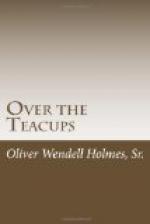Now, what did I expect when I began these papers, and what is it that has begun to frighten me?
I expected to report grave conversations and light colloquial passages of arms among the members of the circle. I expected to hear, perhaps to read, a paper now and then. I expected to have, from time to time, a poem from some one of The Teacups, for I felt sure there must be among them one or more poets,—Teacups of the finer and rarer translucent kind of porcelain, to speak metaphorically.
Out of these conversations and written contributions I thought I might make up a readable series of papers; a not wholly unwelcome string of recollections, anticipations, suggestions, too often perhaps repetitions, that would be to the twilight what my earlier series had been to the morning.
I hoped also that I should come into personal relations with my old constituency, if I may call my nearer friends, and those more distant ones who belong to my reading parish, by that name. It is time that I should. I received this blessed morning—I am telling the literal truth—a highly flattering obituary of myself in the shape of an extract from “Le National” of the 10th of February last. This is a bi-weekly newspaper, published in French, in the city of Plattsburg, Clinton County, New York. I am occasionally reminded by my unknown friends that I must hurry up their autograph, or make haste to copy that poem they wish to have in the author’s own handwriting, or it will be too late; but I have never before been huddled out of the world in this way. I take this rather premature obituary as a hint that, unless I come to some arrangement with my well-meaning but insatiable correspondents, it would be as well to leave it in type, for I cannot bear much longer the load they lay upon me. I will explain myself on this point after I have told my readers what has frightened me.
I am beginning to think this room where we take our tea is more like a tinder-box than a quiet and safe place for “a party in a parlor.” It is true that there are at least two or three incombustibles at our table, but it looks to me as if the company might pair off before the season is over, like the crew of Her Majesty’s ship the Mantelpiece,—three or four weddings clear our whole table of all but one or two of the impregnables. The poem we found in the sugar-bowl last week first opened my eyes to the probable state of things. Now, the idea of having to tell a love-story,—perhaps two or three love-stories,—when I set out with the intention of repeating instructive, useful, or entertaining discussions, naturally alarms me. It is quite true that many things which look to me suspicious may be simply playful. Young people (and we have several such among The Teacups) are fond of make-believe courting when they cannot have the real thing,—“flirting,” as it used to be practised in the days of Arcadian innocence, not the more modern and more questionable recreation which has reached us from the home of the cicisbeo. Whatever comes of it, I shall tell what I see, and take the consequences.




